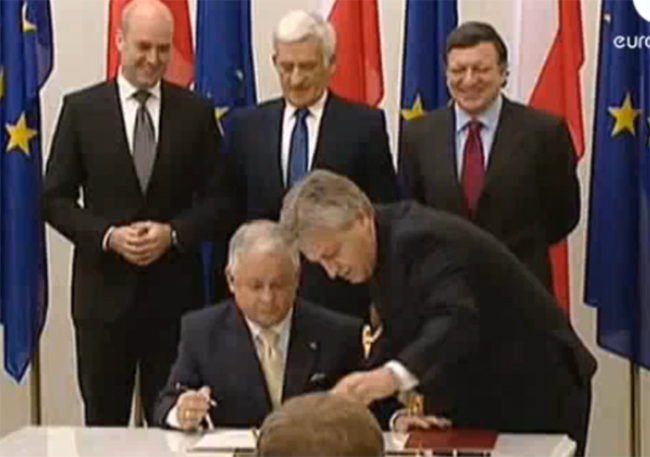Politics
Now just inches from the finish line: Poland signs Lisbon Treaty

Polish President Lech Kaczynski signed the Lisbon Treaty on Saturday, leaving the Czech Republic as the final holdout.
The Czech Republic’s President Vaclav Klaus is awaiting a Constitutional Court ruling on the constitutionality of his signing this landmark agreement. Kaczynski had been holding off on signing the agreement until a second Irish referendum supported Ireland’s agreement a week ago.
Describing the treaty as a major change in the quality of the EU, nonetheless, Kaczynski said: “The Union remains a linking of national states, of sovereign states, and it should stay like that.” As a result of Kaczynski’s signature, the Czech president’s signature is the only impediment to ratification of the Lisbon Treaty by the EU member states.
With the realistic chances of the Czech Republic’s Constitutional Court ruling against the treaty low, Klaus will now come under real domestic, and international, pressure to sign. However, just to keep the tension going, on Friday Klaus added a new condition for signing as he called for a Czech opt-out from the pact’s charter of rights and freedoms, similar to those already obtained by Britain and Poland, to avoid possible land claims by the descendants of ethnic Germans expelled after the war.
The Lisbon Treaty will establish a powerful new presidential position designed to give Europe a unified voice in the world – for additional parity vis-a-vis the US and Russia – as well as on behalf of the EU’s negotiations with emerging powers such as China and India, in better recognition of its global trade and economic weight. In addition, the treaty establishes a top-tier foreign policy position, a new voting structure for the Council of Ministers, and greater involvement of the European parliament in the legislative process through “co-decision” with the Council of Ministers. Further, the Lisbon Treaty would make the EU’s human rights charter, the Charter of Fundamental Rights, legally binding on all members, save for those circumstances where exemptions are granted.
By Brooks Spector
Read more: Lisbon Treaty website





 Become an Insider
Become an Insider